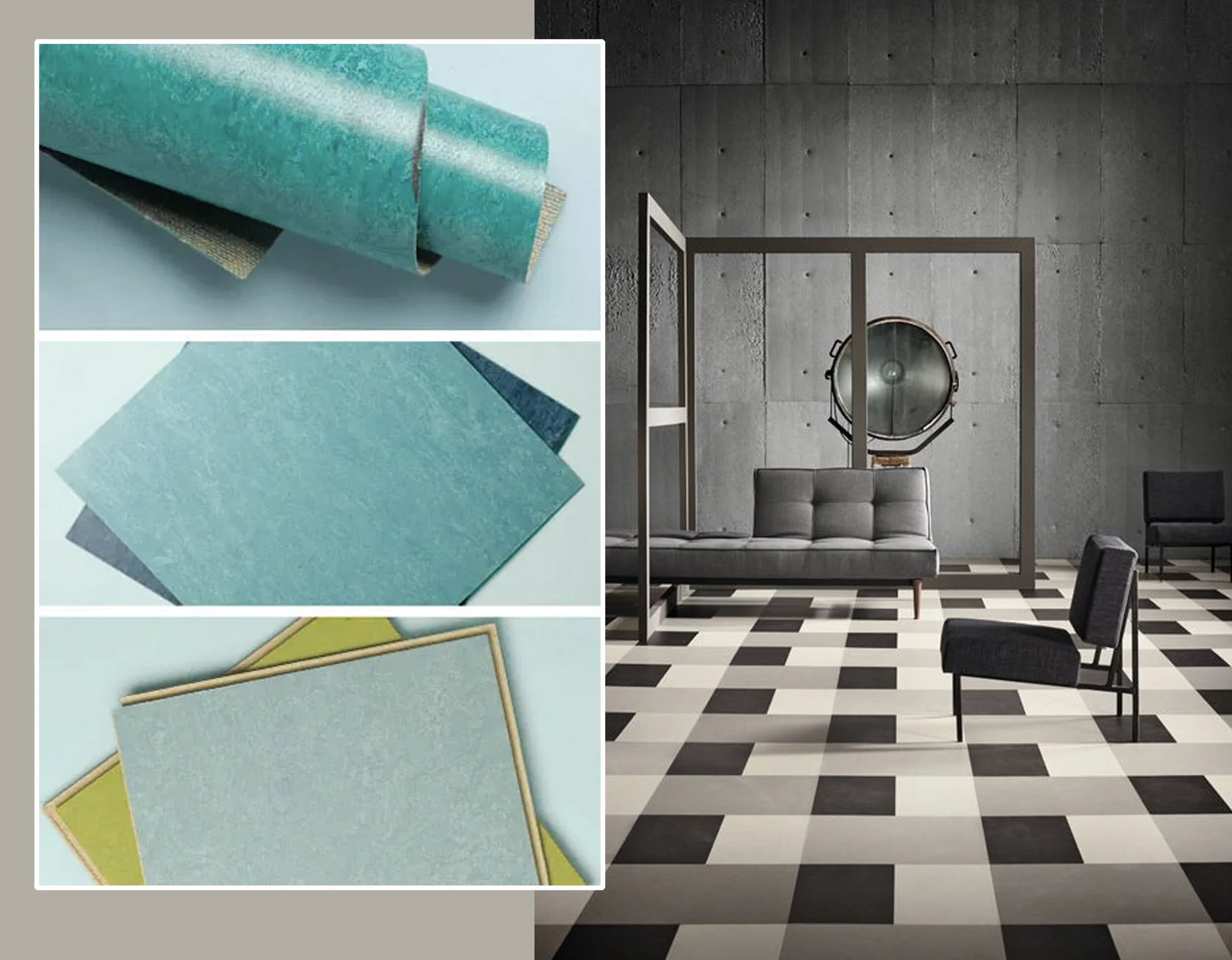Linoleum is not the first material on our list as a possible floor coverings. Often people believe it is the same as vinyl and it is seen as a cheap and ugly material. I love linoleum, it looks amazing, is affordable and biodegradable. It is time to give linoleum a second thought.
image vie Forbo
This durable and easy to clean material was patented in 1862 by Frederick Walton. Yes, used in residential and public spaces, even on the deck of boats, for more than 150 years. The name linoleum is derived from the Latin name for linseed oil, linum and oleum, oil. Other components are cork dust, wood flour, pine resin, ground limestone and natural pigments to bring in the color. The mix is pressed on a jute or canvas backing.
image Forbo
So what is the difference between linoleum and vinyl flooring?
Both affordable, and to some extent also the appearance. Vinyl is a synthetic material, nonrenewable, petroleum based. The color or pattern are applied to the surface only. Linoleum is a biodegradable and the color runs throughout. An advantage of vinyl is that it is water-resistant, linoleum has to be sealed before installation, to make it water repellant. This is now often done during the manufacturing process. It is a good choice for kitchens, bathrooms, entries and laundry rooms. Check with your supplier if the linoleum should be sealed again after a year or so. let’s take a look at the pros and cons of both vinyl and linoleum
Vinyl
Pro
low maintenance
affordable
waterproof
strong colors and patterns
Cons
nonrenewable material
not recyclable
color and pattern on surface
can release toxic gases
Linoleum
Pros
affordable
produced with renewable and recycled materials
not releasing toxins
recyclable and biodegradable
flexible
very soft under the feet
easy to clean
Cons
is not know well, still has bad reputation
can give an unnatural feeling
requires resealing
image on the left via This Old House - on the right via Archello
And maybe you heard about Marmoleum. What is the difference? There is no difference between linoleum and Marmoleum, it is the brand name of linoleum made by Forbo. Forbo is one of the leaders on the market, together with Tarkett.
Linoleum is available in sheets, modular tiles and click-together tiles. Linoleum requires cutting, fitting and an adhesive will fix it on the flat subfloor. This can be quite complicated and you should ask a professional for installation to get the best result. Modular tiles are much easier to instal. They are also fixed on a subfloor with an adhesive. The click-together tiles are easy to install thanks to the tongue-and-groove, the tiles fit together without glue and don’t require a perfect flat subfloor, the perfect DIY solution.
Linoleum is antistatic and antibacterial, this makes it a perfect choice for public spaces bas well as for kitchen and bathroom. Linoleum is easy to clean with vacuum and a damp mop, chemicals are to be avoided.
Linoleum comes in an extended color range and not only in solid colors. Marbled stone-look, wood grain pattern and multicolor speckled options will give you all you need to find your perfect linoleum. The finish is matte, but it can be polished for a more shiny look. You can use linoleum as a solid color or you can get creative in combining colors. The modular tiles will make it easy for you to make a colorful block pattern.
Linoleum is getting trendy and is often chosen by architects and designers to create a bespoke floor in hospitality projects. Linoleum has a lot of advantages that makes it a perfect choice not only for public spaces but also for your home. It repels dirt, easy to clean, perfect for restaurants, but also for your entry hall.
We are far from the linoleum of the beginning of last century. By now you understood that vinyl has nothing to do with linoleum, so it is the moment to consider linoleum as a good option for your home project. This material is comfortable underfoot so a great solution when there are kids in the house. Linoleum has a clean look, colorful and modern, a material for the 21st century. When properly installed and maintained you can have your linoleum for years. When installed over floor heating you should take care that the surface temperature doesn’t go higher than 29 degrees Celcius.
Dare to Rug for Forbo
Manufacturers are working together with designers to come with very trendy proposals for your interior design project. No need to add a rug on top on this beautiful designed surface. Offices are getting a playful touch and can define areas in the big open spaces in a creative way.
Furniture Linoleum Forbo
There are more uses for linoleum than floor covering. It can give a smooth finish to a counter top in a kitchen as long as you don’t start cutting your veggies on it. It is a perfect material to create a retro look.
Furniture Linoleum by Forbo, if you are looking for a natural surfacing material. It can be used on desks, chairs, cabinets and even doors. You will create a elegant and trendy look. The material is flexible, can be applied horizontal and vertical as well as on curved surfaces.
Is linoleum something for you? When you consider it is
budget-friendly
easy to maintain
eco friendly
colorful and trendy
I didn’t use it often in interior design projects till now, but I will for sure propose it as a trendy and timeless option to my clients.
You don’t want to miss any of my blog posts? Follow me on my FB page, or Bloglovin' or even better subscribe to my newsletter







